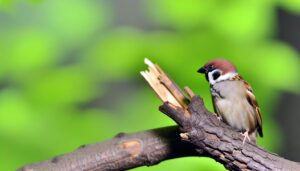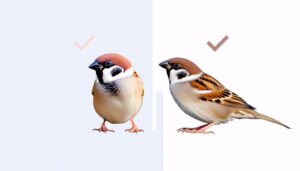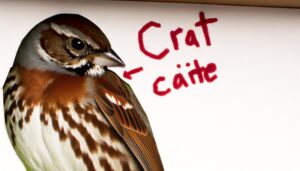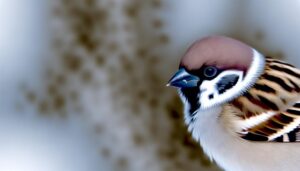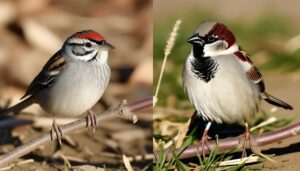7 Reasons You Can Give Flax Seeds to Common Sparrows
Yes, you can indeed offer flax seeds to common sparrows. These seeds are nutritious-packed, offering omega-3 fats, fiber, and protein essential for a sparrow's wellbeing.
They're safe, too, when correctly fed, ideally ground and mixed in regular feed, making up 10% of the sparrow's total diet. Sparrows are initially skeptical of this unfamiliar food source, but with time, they accept and prefer flax seeds.
Proposing flax seeds as part of a varied diet for sparrows encourages their growth and immune health. There's much to discover about the specific benefits and methods of incorporating flax seeds into a sparrow's diet.
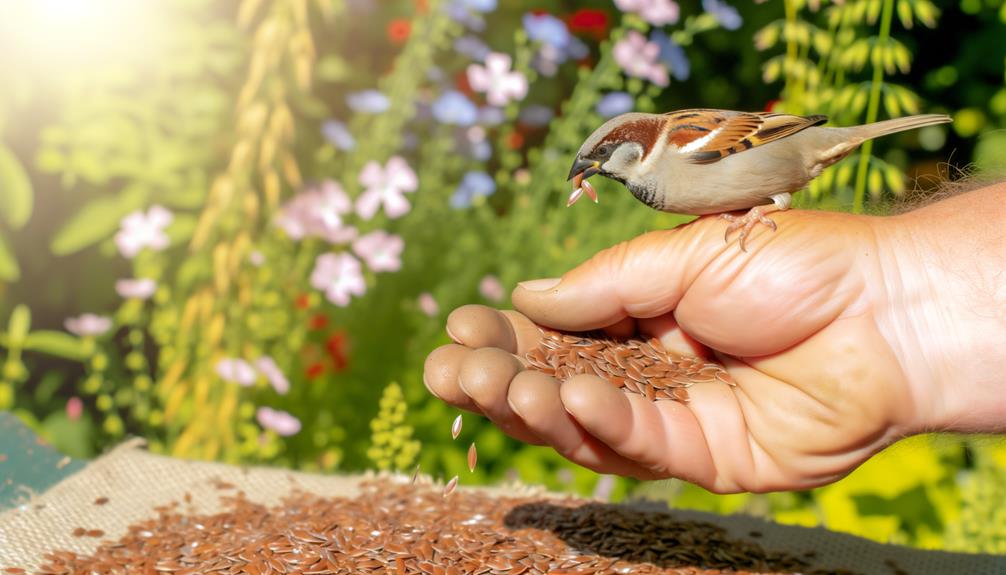
Key Takeaways
- Flax seeds are safe and beneficial for sparrows, offering crucial nutrients like omega-3 fatty acids, fiber, and protein.
- Ground flax seeds can be mixed with sparrows' regular feed, but should not exceed 10% of their total diet.
- Fresh water should always be provided as flax seeds can be dehydrating for sparrows.
- There are potential risks to feeding sparrows flax seeds, including choking hazards and digestive issues, so portion sizes should be monitored.
- Alternative feeding options to flax seeds include sunflower seeds, millet, mealworms, mixed bird seeds, and fresh fruits/vegetables.
Understanding Common Sparrows Diet
While some may assume that sparrows are simply seed eaters, it's important to understand that these common birds have a diverse diet that includes insects, fruits, and grains in addition to seeds.
They're opportunistic feeders, which means they'll eat whatever they can find. Insects are a huge part of their diet, especially during breeding season when protein is essential. Fruits offer them a sweet treat and provide necessary vitamins. Grains, on the other hand, are a reliable food source, particularly in cities and agricultural areas.
What Are Flax Seeds?
Often hailed as a nutritional powerhouse, flax seeds are small, brown or golden-colored seeds that come from the flax plant, packed with essential nutrients like omega-3 fatty acids, dietary fiber, and lignans. These seeds are also known as linseeds and have been consumed for thousands of years, dating back to ancient Egypt.
Flax seeds have a unique profile which includes:
- A high concentration of healthy fats
- High-quality plant-based protein
- Low carbohydrate content ideal for those monitoring their sugar intake
- A rich source of vitamins and minerals
- A significant presence of antioxidants
Furthermore, they have a pleasant, nutty flavor and can be easily incorporated into a variety of dishes. Their versatility and nutritional density make flax seeds a valuable addition to any diet.
Nutritional Benefits of Flax Seeds
Flax seeds offer a rich nutritional profile that can serve as an important boon to the health of common sparrows. The seeds not only provide essential vitamins and minerals but also contain a high level of Omega-3 fatty acids, which can boost a sparrow's overall wellness.
However, it's essential to understand safe feeding practices to prevent any potential health risks to the birds.
Flax Seeds' Nutritional Profile
Packed with a multitude of nutrients, flax seeds offer sparrows impressive health benefits, thanks to their high content of omega-3 fatty acids, dietary fiber, and lignans. The nutritional profile of flax seeds is robust and varies, making it an excellent addition to the sparrow diet.
The nutritional profile of flax seeds includes:
- *Omega-3 Fatty Acids*: These are heart-healthy fats that sparrows can't produce on their own.
- *Dietary Fiber*: This aids in digestion, and can help sparrows feel full.
- *Lignans*: These are plant compounds that have antioxidant qualities.
- *Protein*: Flax seeds are a good source of protein, an essential nutrient for sparrows.
- *Vitamins & Minerals*: Flax seeds contain vitamins like B1 and minerals like magnesium.
Understanding the nutrients found in flax seeds can help sparrows live healthier, more vibrant lives.
Boosting Sparrow Health
Drawing from the rich nutritional composition of flax seeds, it's evident how their inclusion in a sparrow's diet can greatly enhance the bird's overall health and significance. Brimming with Omega-3 fatty acids, flax seeds aid in maintaining healthy feathers, boosting immune system strength, and supporting cardiovascular health.
The high protein content ensures prime growth and development, while the fiber aids digestion.
Moreover, the lignans in flax seeds may offer antioxidant benefits, protecting sparrows from harmful free radicals. These tiny seeds also provide essential minerals like magnesium and phosphorus, necessary for bone health.
As a result, incorporating flax seeds into a sparrow's feed not only meets their nutritional needs but also fortifies them against common health issues, enhancing their overall wellbeing.
Safe Feeding Practices
While feeding flax seeds to sparrows, it's crucial to follow safe practices to make certain they're reaping the maximum nutritional benefits without harm. These practices include:
- Always providing fresh, untreated flax seeds. Rancid or chemically treated seeds can cause health issues.
- Limiting the amount of flax seeds. Excessive intake may lead to obesity or nutritional imbalances.
- Mixing flax seeds with other seeds to guarantee a balanced diet.
- Observing the sparrow's behavior post-feeding. Any changes could indicate an issue.
- Cleaning feeders regularly to prevent bacterial build-up.
Understanding and implementing these practices guarantees that sparrows gain the essential omega-3 fatty acids, lignans, and fiber present in flax seeds, enhancing their overall health while preventing potential harm.
Are Flax Seeds Safe for Birds?
Contrary to some misconceptions, flax seeds aren't only safe for birds like the common sparrow, but they're also incredibly beneficial. They're packed with essential nutrients that contribute to a bird's overall health.
Flax seeds are rich in omega-3 fatty acids, which are known to enhance the sheen of a bird's feathers and boost their immune system. They also contain lignans, compounds that have antioxidant properties, crucial for combating harmful free radicals in a bird's body.
No substantial evidence has been found to suggest that flax seeds are harmful to birds. In fact, most research indicates the opposite. It can be confidently stated that flax seeds are safe and even advantageous for birds, including the common sparrow.
Feeding Flax Seeds to Sparrows
Now that we've established the safety and benefits of flax seeds for birds, let's explore how to properly feed these nutritious seeds to common sparrows.
Here's a simple, step-by-step guide to follow:
- *Purchase raw, organic flax seeds.* They're easily accessible in most health food stores.
- *Grind the seeds.* Sparrows find it easier to consume flax seeds when they're ground to a fine powder.
- *Mix the ground flax seeds with their usual feed.* This guarantees they're not overwhelmed by the new food.
- *Gradually increase the proportion of flax seeds.* Sparrows should ideally consume flax seeds as 10% of their diet.
- *Observe your sparrows.* If they show any adverse reactions, stop feeding them flax seeds immediately.
Potential Risks and Precautions
While flax seeds are generally safe for sparrows, there may be potential risks associated with excessive or improper feeding. It's important to identify these hazards to guarantee the health and well-being of these common birds.
Following this, the discussion will also highlight the essential precautionary measures bird enthusiasts should take when incorporating flax seeds into the diet of sparrows.
Identifying Potential Hazards
Feeding flax seeds to common sparrows isn't without its potential risks, and bird enthusiasts must be aware of these hazards to guarantee the safety of these petite creatures. While flax seeds can offer beneficial nutrients, they also present potential dangers:
- Choking Hazard: Flax seeds are small, but they may still pose a choking risk, especially for younger sparrows.
- Digestive Issues: Sparrows could experience digestive issues if they consume flax seeds in large quantities.
- Pesticide Exposure: Commercially grown flax seeds can contain pesticides harmful to sparrows.
- Nutritional Imbalance: Too much of one type of food can lead to nutritional imbalances.
- Attraction of Predators: An abundance of food can attract predators, posing a risk to sparrows.
Identifying these hazards is the first step in maintaining the health and safety of sparrows.
Essential Precautionary Measures
Having identified the potential risks, it's time to address the precautions one must undertake to mitigate these hazards when giving flax seeds to common sparrows.
To start with, it's crucial to monitor portion sizes. Overeating can lead to digestive issues in sparrows.
Next, always offer seeds in a clean, shallow dish to prevent ingestion of harmful bacteria. Also, sparrows should have access to fresh water to help in digestion.
Importantly, refrain from giving processed or salted flax seeds, as they can be detrimental to the bird's health.
Lastly, introducing any new food should be gradual, observing the bird's reaction. If any adverse effects are noticed, flax seeds should be removed from their diet immediately.
Other Beneficial Seeds for Sparrows
In addition to flax seeds, there are several other seeds that are highly beneficial for the health and wellbeing of common sparrows. These seeds provide the necessary nutrients and energy that sparrows need to thrive.
Here are some other beneficial seeds for sparrows:
- Millet: This tiny, round seed is a staple in many sparrow diets. It's packed with proteins, antioxidants, and dietary fibers.
- Sunflower seeds: They're rich in healthy fats and vitamins, providing sparrows with the energy they need for daily activities.
- Nyjer seeds: These small, black seeds are high in oil content, which is great for a sparrow's skin and feathers.
- Safflower seeds: They're an excellent source of proteins and fats, essential for sparrows.
- Cracked corn: Sparrows love this as it's easily digestible and provides essential nutrients.
How to Incorporate Flax Seeds in Sparrows' Diet
To enrich a sparrow's daily diet with the nutritional benefits of flax seeds, it's crucial to comprehend the most effective methods of incorporating these seeds into their meals.
Flax seeds should be ground into a fine meal to aid in the bird's digestion. This process maximizes the release of healthy oils and nutrients, making them more accessible to the bird's system. The ground flax can then be mixed into their regular seed mix, ensuring a balanced diet.
Additionally, one must remember to provide a fresh supply of water as flax seeds can be dehydrating.
Lastly, flax seeds shouldn't make up more than 10% of the total diet, as excessive amounts can lead to health issues.
Sparrows' Reaction to Flax Seeds
Observing sparrows' reactions to flax seeds, it's clear that these birds, while initially wary, typically grow accustomed to the new addition in their diet and eventually consume it without hesitation.
These reactions can be divided into several stages:
- Initial skepticism: Sparrows are often suspicious of new foods and might avoid flax seeds at first.
- Investigation: Over time, they begin to peck at the seeds, testing them out.
- Acclimation: Sparrows grow more comfortable with the seeds as part of their diet.
- Acceptance: Once familiar with flax seeds, sparrows eat them readily.
- Preference: In some cases, they may even start to prefer flax seeds over other foods.
Evidently, the introduction of flax seeds to sparrows requires patience, but it's generally well-received in the end.
Expert Opinions on Feeding Flax Seeds
While sparrows generally accept flax seeds as part of their diet, expert ornithologists and avian nutritionists have shed light on the benefits and potential concerns of this dietary alteration. They've noted that flax seeds are rich in omega-3 fatty acids, which support heart health and feather quality.
However, experts also caution against feeding sparrows flax seeds exclusively, as this can lead to an unbalanced diet. They warn that flax seeds alone mightn't provide all the nutrients that sparrows need, such as protein and certain vitamins. Additionally, some sparrows may have difficulty digesting flax seeds, leading to potential health issues.
Experts suggest that flax seeds can form part of a healthy, varied diet for sparrows, but shouldn't be the sole food source.
Alternative Feeding Options for Sparrows
In light of the potential drawbacks of relying solely on flax seeds, it's important to explore alternative feeding options that can provide sparrows with a balanced, nutritious diet. A diverse selection of foods not only meets their nutritional needs but also mimics their natural diet more closely.
- Sunflower seeds: High in fats, they provide energy for sparrows' high metabolism.
- Millet: Small, easy-to-eat grains are a favorite among many sparrows.
- Mealworms: Offering protein, they mimic the insects sparrows naturally eat.
- Mixed bird seeds: A blend guarantees a variety of nutrients.
- Fresh fruits and vegetables: Small pieces of apple or leafy greens contribute to vitamin content.
Conclusion
In a delightful twist of fate, flax seeds prove to be a nutritious addition to the common sparrow's diet. These tiny seeds pack a powerful punch of omega-3s and fiber, offering health benefits to our feathered friends.
Experts concur that incorporating flax seeds can enhance sparrows' health, though alternative options should also be considered.
So, next time you see sparrows chirping away, remember, a sprinkling of flax seeds could just be their next favorite treat!

